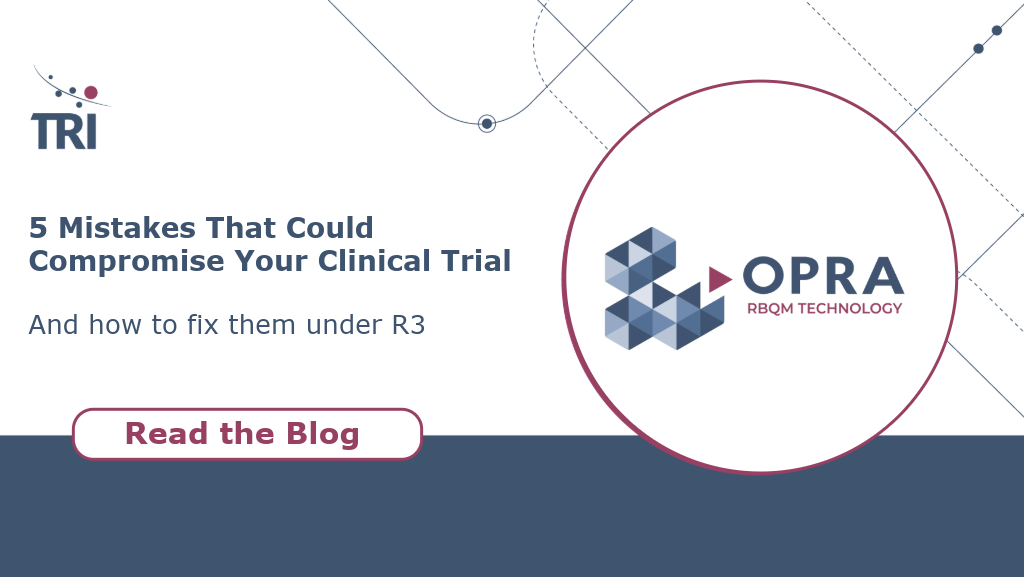5 Mistakes That Could Compromise Your Clinical Trial

How to Fix Them Under R3
Despite growing awareness, Risk-Based Quality Management (RBQM) remains widely misunderstood, and often misapplied. Even small missteps can lead to delays, compliance issues, and wasted resources.
According to the Association of Clinical Research Organizations (ACRO), only 57% of trials fully apply RBQM principles, leaving the rest vulnerable to delays, compliance risks and costly inefficiencies.
Under ICH E6 (R3), sponsors are expected to proactively manage risks throughout the trial lifecycle. At TRI, we’ve seen firsthand how small missteps can derail even the most promising studies. Here are five common RBQM mistakes, and how our purpose-built platform, OPRA, helps you avoid them.
Delaying Risk Assessment Until the Trial Starts
Risk assessment should begin during protocol development. Studies show that early identification of critical-to-quality factors can dramatically reduce protocol amendments and improve trial outcomes.
OPRA Solution: Our built-in risk assessment tools guide teams through structured evaluations during protocol development, helping you manage risks before they become problems.
Failing to Monitor Data Trends in Real Time
Manual reviews and fragmented systems simply can’t keep pace with the demands of modern clinical trials. Centralized monitoring has been shown to detect over 90% of issues typically uncovered during on-site visits, often earlier and with greater accuracy. Without real-time visibility, teams risk missing critical signals that could compromise data integrity or delay decision-making.
OPRA Solution: OPRA’s real-time dashboards surface deviations and trends instantly, enabling proactive decisions and reducing reliance on 100% Source Data Verification.
Treating Every Site the Same
Not all sites carry the same risk. Oversight should be tailored based on geography, experience, and performance. Tailored oversight improves efficiency and reduces unnecessary monitoring.
OPRA Solution: OPRA profiles each site’s risk level, allowing sponsors to adjust monitoring intensity and focus resources where they’re needed most, helping you manage risks more strategically.
Neglecting Staff Training and Engagement
RBQM adoption often fails due to lack of awareness and buy-in. Teams need more than tools. They need understanding. Studies show that structured training improves risk detection and data quality.
OPRA Solution: OPRA includes scenario-based training modules that help teams internalize their role in risk management and build a culture of quality.
Relying on Generic Tools
Spreadsheets and generic systems might feel familiar, but they’re not built for RBQM. They slow decision-making and increase compliance risks. OPRA was designed specifically for RBQM, centralizing risk data, automating alerts, and enabling faster, smarter decisions. With OPRA, your team works in sync, stays audit-ready, and makes proactive choices that protect clinical trial quality.
Why OPRA Makes RBQM Work
At TRI, we didn’t build OPRA to follow trends, we built it to solve real problems we’ve seen across hundreds of clinical trials.
RBQM works best when teams have the right tools to act with confidence. It supports the principles of ICH E6 (R3) and helps teams manage risks with precision. OPRA brings all of that together. When you remove the guesswork, you make room for trials that are stronger, smarter, and built to succeed.
